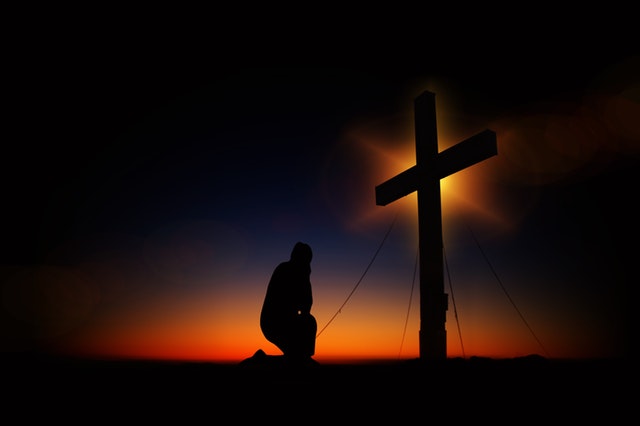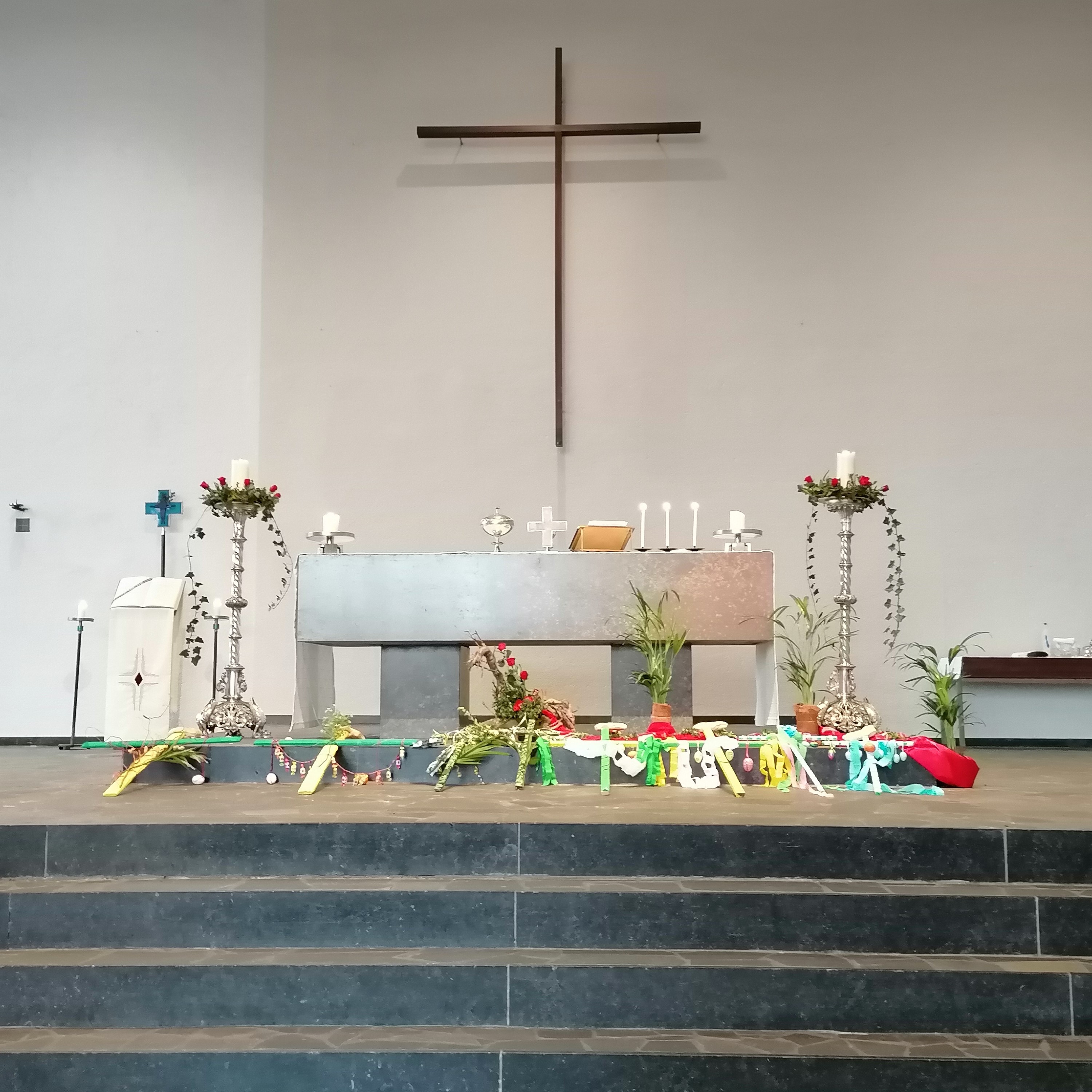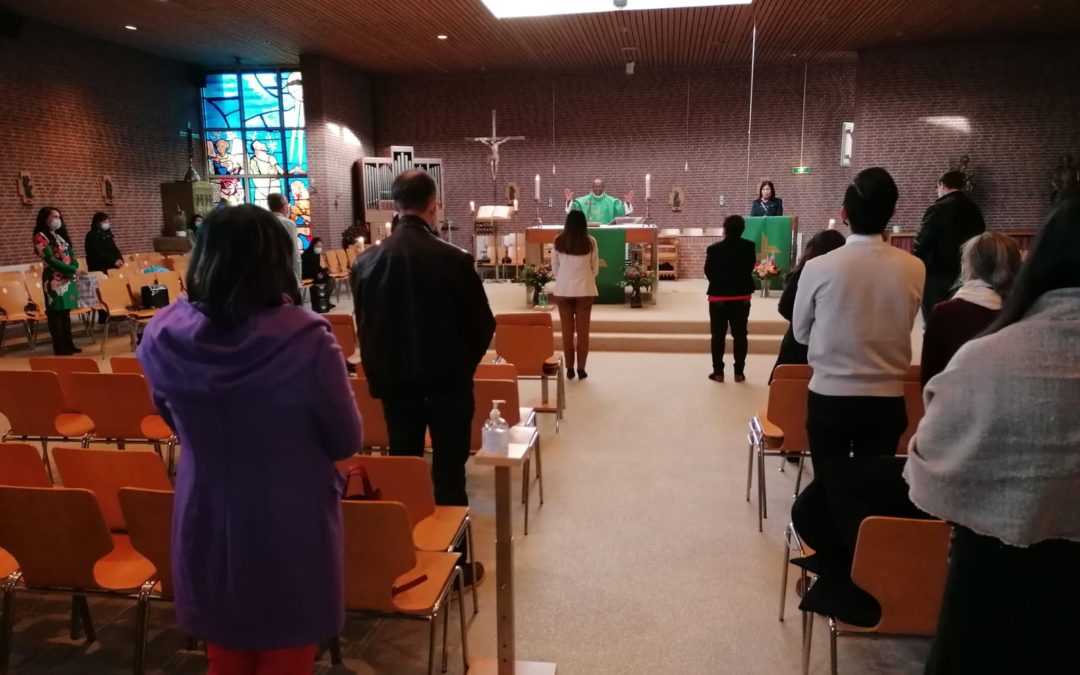
Jun 27, 2021 | Homily
By Fr. Marcel Uzoigwe, CSSp.
(Wis.1:13-15,2:23-24, Ps.29:2.4-6.11-13, 2Cor.8:7,9,13-15 & Mk.5:21-43)
The three readings focus on life, suffering, sickness, and death, and portray the divine intention to give life to all men and women. God heals the sick and restores the dead to life, calling us to be the channel through which he reaches out to the needy.
The Bible opens with the account of creation, showing us that God created humans in his image and likeness (cf. Genesis 1:27). From the very beginning, therefore, humanity shared the life of God and enjoyed his companion until the event of man’s disobedience (cf. Genesis 3), which the first reading refers to as the origin of death occasioned by the envy of the devil. That event brought about rejection and suffering emanating from the expulsion of Adam and Eve from the garden of Eden where God frequently walked with them. Being separated from God is, therefore, regarded as being dead since God is the source and sustenance of life. As Romans 6:23 puts it, “For the wages of sin is death, but the gift of God is eternal life in Christ Jesus our Lord.”
The first reading emphasizes that death was never the intention of God, but that humanity might live eternally with God. Disobedience, which is commonly associated with the devil, is portrayed as arising from envy sold out by the devil to the first parents when they took the devil’s advice and sought to be like God by eating of the tree of the knowledge of good and evil. That act opened the doors to suffering and death. But God, in His love and mercy, does not leave humanity to suffer the full consequence of his failure. Therefore, Jesus comes to “undo the works of the evil one” (cf. 1 John 3:8) and restore humanity to life, health and happiness.
The gospel presents us with vivid examples of physical death, as well as a human situation of suffering that is nearly as good as dead. The case of the little girl who was raised by Jesus stands for physical death, while the woman with a flow of blood symbolizes a soul directly separated from the community, and remotely alienated from God. The condition of the woman was a state of uncleanness which brought with it untold sufferings in those days due to the recommendations of the Jewish ritual laws. The law states: “when a woman is afflicted with a flow of blood for several days outside her menstrual period, or when her flow continues beyond the ordinary period, as long as she suffers this unclean flow, she shall be unclean” (Lev. 15:25). The situation is so unfortunate that she contaminates anything or person she touches while under such a condition. As a result of that, she suffers ex-communication from the liturgical and social life of Israel. This separation from the covenant life of Israel in those days mirrors the effect of sin in the soul of a Christian today which leads to spiritual death.
The issue of sin and the manner it separates men from the goodness of God are implicated in the two readings (first reading and the Gospel). Disobedience leads to sin which separates a person from the covenant relationship with God and is considered spiritually dead. This is implied in God’s fore-warning to Adam and Eve against the forbidden fruit: “… for the day you eat of it, you shall die” (Gen. 2:17). Evidently, Adam and Eve did not die physically on the day they ate the fruit; but they did spiritually. They were alienated from God. Again, in the parable of the prodigal son, the father described his returnee son as one who “was dead and has come back to life” (Lk 15:24). He was dead when separated from his father. This is the lot of those pilgrim souls that are separated from God. Hence, the prophet says: “It is sin that separates us from God” (Isaiah 59:1-2). Those who on account of their sins (uncleanness) are separated from God are spiritually dead, though physically they are deemed to be alive. That is why Jesus describes the church in Sardis as a dead church saying: “You are reputed to be alive whereas you are dead” (Rev. 3:1).
The good news is that Jesus has come to restore us to life. He is here to take away our suffering, pain, and death (cf. Isaiah 54:4). Both the father of the little girl raised by Jesus and the woman with hemorrhages demonstrated the faith required to connect to the power of Jesus to restore life and health. There were many people following Jesus, touching and pushing all around him. But the moment the woman with the flow of blood touched Jesus, power went out of him, and she was healed. Faith is what made the difference. Jesus confirmed her faith when he said to her, “Daughter, your faith has saved you. Go in peace and be cured of your affliction” (Mark 5:34). Hebrews 11:6 has it that without “without faith it is impossible to please God”.
The centurion whose daughter died demonstrated similar faith when the people came to tell him that his daughter has already died. Jesus said to him, “Do not be afraid; just have faith.” The centurion believed the words of Jesus and refused to listen to the people asking him to stop disturbing Jesus. He believed that Jesus is capable of raising his daughter from the dead. That faith worked for him. Jesus always needs us to believe. Otherwise, we can’t connect to him. When Jesus came to the grave of Lazarus in John chapter 11 and asked that the grave be opened, you remember what he said to Martha who was worried that Lazarus would be smelling, having died four days ago? Jesus said, to Martha, “I am the resurrection and the life. Whoever believes in me, though he dies, yet shall he live, and everyone who lives and believes in me shall never die. Do you believe this?” (John 11:25-26). The question is not about what God can do. God can do all things. The question is whether we believe it or not. That is what made the difference between the touch of the woman with the issue of blood and the touch of those following Jesus around without faith. It is what made the difference between the centurion and the people letting him leave Jesus alone because his daughter is already dead.
Dear friends, coming to God without a living faith is like going to a social gathering. What marked out the early Christian community, inspired them to live and preach the Gospel as well as remain steadfast in the face of the persecution they went through is their unwavering faith in Jesus Christ. Faith is not a theoretical or abstract concept. It is a supernatural gift of God that enables us to believe and live out all the teaching of Christ which the church teaches. It is faith that enables us to recognize our need for God, return in contrition when we have sinned, and live joyfully the message of the Gospel. Faith and action go together because, as James puts it, “faith by itself, if it does not have works, is dead” (James 2:17). Paul, therefore, calls our attention in the second reading to put our faith to action, not just with regard to our own interests, but more importantly in what concerns the welfare of those in need.
The faith we profess becomes concrete and serves as a witness to Jesus when its effect is felt among those in need. What marked the ministry of Jesus was his going about doing good, and healing all that were oppressed of the devil (cf. Acts 10:38). We have seen that in the two healings in the Gospel reading. We cannot claim to be the followers of Jesus without walking in his steps, doing good to those in need of our help, bringing life and love to all around us. Paul began his appeal in the second reading by assuming that we already excel “in every respect, in faith, discourse, knowledge, all earnestness, and in the love we have for you” before appealing that we also excel in being charitable. That indicates that works of charity are an expression of what we have within us as Christians, and its expression is simply a sign of our collaboration with God who does not will suffering and death for mankind. Our call, therefore, is to believe as well as play active roles in the mission of Jesus Christ who comes to heal and give life to all.
May God grant healing to the sick, heal the brokenhearted, restore the spiritually dead to life, and grant us the grace to walk in his footsteps bringing joy and life to all we meet. Amen.

May 23, 2021 | Homily
By Fr. Marcel Uzoigwe, CSSp. | Acts 2:1-11, Ps.103:1.24.29-31, 1Cor.12:3-7,12-13 & Jn.20:19-23
Dear brothers and sisters,
We celebrate the outpouring of the Holy Spirit on the Pentecost day. In its original Jewish celebration, Pentecost has nothing to do with the Holy Spirit. It was rather, a Jewish agricultural Feast of thanksgiving for the rich harvest. And it is celebrated to mark the end of the Paschal Feast (Easter) celebration. The Pentecost celebration comes after fifty days of the Paschal Feast; hence the name Pentecost is taken from the word ‘Penta’ meaning fifty.
During his ascension into heaven, Jesus instructed his apostles not to leave Jerusalem but to wait in prayer until the Holy Spirit promised by the Father comes down upon them (Acts 1:4). They would then bear witness to him ‘in Jerusalem, and in Judea, and in Samaria, and unto the uttermost part of the earth’(Acts 1: 8). Acts1:4-5. That served as a period of preparation to get themselves ready for the indwelling of the Holy Spirit for the work of the mission. Interestingly, God in his infinite wisdom decided to fulfill this promise to send the Holy Spirit on the day of the Jewish feast of the Pentecost, when so many Jews in diaspora were expected to be in Jerusalem.
The first reading deals with the account of the descent of the Holy Spirit. It gives a number of elements that characterized the changes that the Holy Spirit brought with it to the disciples. First, we see the same people who locked themselves up for fear of the Jews emerge from their hideout to speak to the people in all boldness about Jesus Christ, proclaiming the same message for which he was crucified. Paul will later write that ‘God gave us a spirit not of fear but of power and love and self-control’ (2 Timothy 1:7). The coming of the Holy Spirit ushered a new era where truth cannot be suppressed out of fear of bodily torture or death. Secondly, what the apostles said could be understood by all the people that assembled there in their own native languages. This phenomenon contrasts what happened in the ancient time at the Tower of Babel (Gen.11), when the people rebelled against God and ceased to understand each other’s language. The Pentecost event is seen as a reversal of the confusion and disorder at Babel that symbolizes division among men. It was Caiaphas, the Chief Priest, who prophesized that “Jesus would die for the nation, and not for the nation only, but also to gather into one the children of God who are scattered abroad” (John 11: 51-52). Thirdly, the single preaching of Peter on the day of Pentecost was so powerful that it brought 3000 people to repentance. It is indeed ‘not by might, nor by power, but by my Spirit, says the Lord’(Zech. 4:6). The Holy Spirit can do all things, and is essential for the living out of the Gospel and witnessing to it.
Paul tells us in the second reading that ‘no one can say, “Jesus is Lord,” except by the Holy Spirit’. The coming of the Holy Spirit brought about great transformation such that we are given any of the various gifts of the Spirit. During the nine days novena by which we prepared for this day, we have explored and reflected on these gifts of the Holy Spirit, their impacts and uses in the life of the recipient. Besides the sanctification of the Christian, the gifts are bestowed for various services in the body of Christ, the Church. That there are different gifts is an indication that all bearers of the different gifts are meant to work together knowing that it is the same Lord who bestows the gifts that we serve in each other. That corresponds with the significance of the one language spoken by the Apostles that is understood by all in their native languages. It is also an indication that the Good News is meant to gather the human family scattered into factions by prejudices, hatred and selfishness, to speak now the one common language of love, knowing that God, whose children we are, is love (1 John 4:8). After all, ‘in one Spirit we were all baptized into one body, whether Jews or Greeks, slaves or free persons, and we were all given to drink of one Spirit’ (1 Corinthians 12:13). This theme of unity is an invitation to overcome everything that is capable of separating us from one another, and from God our father; that includes sin and anything that causes division. So, Jesus bestows on his disciples the power to forgive sins, as we read in the Gospel of today.
Having suffered a lots in the hands of the Jews, as well as desertion by his very disciples during his Passion, Jesus understands the importance of forgiveness and reconciliation as a means to achieve peace and harmony. On appearing to his disciples, he breathed on them saying, “Receive the Holy Spirit. Whose sins you forgive are forgiven them, and whose sins you retain are retained” (John 20:23). Forgiveness of sins characterized Jesus’ ministry to the discontent of the Jewish authorities (Mark 2:7). But it is at the very heart of the redemption that he brought. As Paul puts it, “All this is from God, who reconciled us to himself through Christ and gave us the ministry of reconciliation” (2 Corinthians 5:18).
With the sending of the Holy Spirit, Jesus commissioned his disciples to take up the mission he started. They are to take the Gospel to all corners of the earth, preaching repentance and forgiveness, baptizing the converts in the name of the Father and of the Son and of the Holy Spirit. This empowerment is extended to all of us who have been called and bestowed with the Holy Spirit to share in the mission of Christ. It is a call to live out the demands of the Gospel in our daily lives as well as witness to it among men.
Pentecost is, therefore, not a mere historical event, but a living event of the constant outpouring of the Holy Spirit to renew the face of the earth. Pentecost experience is not a once in a lifetime event. Constant renewal and infilling by the Holy Spirit on those who have earlier received him is evidence in the Bible (John 20: 22; Acts 2:1-4; Acts 4:31). We must continually pray to be filled anew by the Holy Spirit. May this celebration serve to fulfil the purpose of the Pentecost in our lives. Amen.

Apr 25, 2021 | Homily
By Fr. Marcel Uzoigwe
Acts 4:8-12 | Psalm 117:1.8-9.21-23.26.28-28 |1 John.3:1-2 | John 10:11-18
Today the Church celebrates the Good Shepherd Sunday and the Gospel reading presents Jesus as the
Good Shepherd who cares for his flock. It is customary today to pray for leaders, especially ecclesiastical
leaders that they might follow the example of Jesus the Good Shepherd in all they do, as well as for
vocations to the Priestly and religious life.
There are many passages in the Old Testament that speak of God as the Shepherd of Israel. It is easier to
understand the analogy of a shepherd and his flock in the context of the traditional life in the time of Jesus
that resulted from centuries of the nomadic lifestyle in which shepherding the flock featured prominently
in their lifestyle. The care, protection, and guidance that a shepherd gives to the flock gradually became
for the Israelites a metaphor for understanding God’s love, guidance, care, and protection against the
constant aggression from their enemies. The Psalmist expresses this in various ways; The Lord is my shepherd, there is nothing I shall want (Ps 23:1). Give ear, O Shepherd of Israel, you who lead Joseph’s
flock! (Ps 80:1). We are his people and the sheep of his flock (Ps 100:3). The prophet Isaiah also sees the
Messiah as the shepherd of God’s people who will feed his flock like a shepherd, and gather the lambs in
his arms (Isaiah 40:11), and many more.
Peter was bold, in the first reading, to remind the Jewish leaders what should be their function: to protect
and care rather than condemn and punish. Instead of rejoicing that a cripple is healed, they were rather
worried that the healing was done by a group they would rather not have, the followers of Jesus. Having
crucified Jesus, it was disturbing to them to learn that they could still have to contend with the effects of
his power working through his disciples. One can imagine their feeling when Peter declared that it is only
in the name of Jesus that salvation, both temporal and eternal, can be obtained. The stone which they, the
builders rejected, has become the cornerstone. The action of the Jewish leaders depicts that of a hired man that Jesus spoke about in the Gospel reading. The hired man does not feel responsible for the sheep and therefore abandons it once it gets attacked. He is out to seek his interest rather than that of the sheep, just as the Jewish leaders were more interested in exerting their authority on the people than having someone else solve their problems and therefore risk diverting their allegiance. Jesus, on the contrary, is the Good Shepherd who lays down his life for the sheep. He knows his sheep and they know him. Moreover, he is so close to them that they know his voice.
By contrasting the good shepherd with the hired man, Jesus brings out the traits of a good leader. A good
leader is not a boss who commands the subjects around like the earthly leaders, but a servant leader. He
goes ahead of the people he leads, clears every danger on the way, prepares good pasture for them so that they can properly feed and rest peacefully. Psalm 23 details the function of a good shepherd from the perspective of what God does for the Israelites. Considered in this context, and in contrast with the actions of the Jewish leaders at the instance of the healing of the cripple at the Beautiful Gate, the readings set the stage for us to evaluate how our leadership at various levels mirror that of Jesus who heals, teaches, cares, protects, forgives, loves, and guide us unto eternal life.
When Jesus described himself as the Good Shepherd, he employed the Greek word “Kalos” (Ego eimi ho
poimen ho Kalos – ἐγώ εἰμι ὁ ποιμὴν ὁ καλός), which refers to that which is intrinsically good, ideal and
a model that others could imitate. The goodness of Jesus is inherent in his being, and therefore authentic,
as opposed to aesthetic, fanciful, and temporal goodness that is dependent on situations and other
interests. The goodness that is external to one’s nature does not survive in the face of challenges. It could
be likened to cosmetic or aesthetic goodness. This does not define a person’s identity but only says something about his or her appearance. To look good is different from being good. Appearance and reality are not the same. We should look good as well as be good.
Jesus, therefore, challenges us to imitate his goodness, honesty, and dependability in the leadership and
fellowship in our community, and in all our dealings with people. This kind of goodness does not wane even in the face of challenges or trials. Peter and his fellow apostles did not deny the truth of Jesus even in the face of the hostile Jewish leaders just as Jesus, while subjected to extreme torture and insults while hanging on the cross, responded with a prayer of forgiveness for his unjust aggressors rather than call for vengeance.
The Good Shepherd lays down his life for his sheep. This is why Jesus Christ is both shepherd and lamb.
Hence, he died to save his flock as a lamb of sacrifice, prefigured by the Passover Lamb, willingly laying
down his life for us. He is our Ransom. In the consciousness of this fact, we can say with the psalmist:
“Even though I walk through the valley of Shadow of death I shall fear no evil (Ps 23:4)” knowing that
Jesus the Good Shepherd is always with us. The psalmist says “with your rod and your staff you give me
comfort”. The staff of the Good Shepherd is the cross. As God worked through the rod of Moses to deliver Israel from Egypt, so does he deliver us from death through the Cross of Jesus. When the valley of death threatens, the Lord whispers to us in a gentle voice: “Be of good cheers, I have conquered the world” (Jn.16:33).
It is our duty, therefore, to give a listening ear to Jesus, our Good Shepherd. He knows us, his flock, and
expects us to know him in return, and follow him as he leads us to greener pasture. He will never desert
us. Hence, it is for us to live in trustful faith in him, learning in our turn to show the same care, love, and
protection to those around us who need it. People will only feel the presence and care of Jesus through us,
just as the man at the Beautiful Gate experienced the healing power of Jesus through his Apostles. May the celebration of Jesus, the Good Shepherd, enable us to make the necessary effort to become good followers of Jesus, and in turn be good leaders who love, care, protect, guide, and give a good example to our children and those around us. Peace be with you.

Mar 28, 2021 | Homily
By Fr. Marcel Uzoigwe, CSSp.
(Is.50:4-7, Ps.21:8-9.17-20.23-24, Phil.2:6-11 & Mk.15:1-39)
Today is Palm Sunday which begins the Holy Week. The Palm Sunday event marks Jesus’ triumphant entry into Jerusalem to accomplish his redemptive mission of saving humanity from eternal damnation through his passion, death, and resurrection. This event and the joyful acclamation of the crowd show Jesus as Messiah and King. When the crowd acclaimed Jesus as the Son of David (Hosanna to the son of David), they allude to his royal credentials, and when they acknowledged him as “He who comes in the name of the Lord”, the Messiah is understood, that is, the one who is promised to Israel.
On this triumphal procession, Jesus chose to ride on a colt, not on horseback as would kings and earthly warlords. His choice of the poor humble animal highlights his humility and justifies his identity as the prince of peace. His humble procession shows the nature of his victory. He is humble yet victorious, gentle and triumphant; teaching us the gallantry of meekness. In him, we see the power of humility. Hence, all the readings this Sunday highlight Jesus’ humble obedience to carry out the will of the Father who sent him into this world for our redemption.
In the first reading from the prophet Isaiah (Is.50:4-7), Jesus is depicted as the Suffering Servant of the Lord whom the Lord wakes up every morning to listen to his word as a disciple, so as to know how he would respond to the weary hearts. This text reminds us that a true prophet is a person of prayer who regularly listens to God in a master-disciple relationship so as to be able to communicate to the people what God really commands. No one can speak God’s word meaningfully to others without first listening prayerfully to the word himself. Jesus is a classic example of this. His life and ministry were filled with constant prayers and solitude (Mark 1:35; Mark 6:46; Luke 6:12; Luke 11:1).
St Paul exhorts us in the second reading to embrace a deeper life of Christian love and unity by making every effort to avoid any form of self-seeking and self-aggrandizing behavior, but rather to be humble and self-effacing. We are to emulate the humility and self-emptying attitude taken by Jesus who, though he was divine yet “humbled himself becoming obedient to death, even death on a cross. Because of this, God greatly exalted him…. at the name of Jesus, every knee should bend and every tongue confesses that Jesus is the Lord” (Phil. 2:8-10). Humility is an important mark of discipleship. There are two types of Christian discipleship: those who follow Jesus in their own terms, doing things their own ways, and those who follow Jesus in obedience, striving to follow the teachings of Jesus the way he taught them. Both are separated by subtle pride and humility. While pride marks the first group, the second group is recognizable by their act of humility. Genuine love and humility of heart are indispensable for anyone that really wants to follow in the footsteps of Jesus Christ.
Today’s Gospel reading comes before the procession with palms and relates to the event of Palm Sunday. Jesus triumphantly went into Jerusalem knowing full well what awaits him there – betrayal, rejection, and crucifixion. His entry into Jerusalem, riding a colt, was a direct fulfillment of the Messianic prophecy of Zechariah (9:9): “Rejoice greatly, O daughter of Zion. Shout aloud, O daughter of Jerusalem. Lo, your king comes to you; triumphant and victorious is he, and riding on a donkey and upon a colt the foal of a donkey”. The colt was a sign of peace. Jesus enters Jerusalem in meekness and humility, as the Messianic King who offers victory and peace to his people. The crowd threw their cloaks on the road to express their homage to him. But just as we shall see in the Passion narrative, most of these same persons who welcomed Jesus with shouts of joy also joined to demand his crucifixion. Thus, the children of the kingdom are not just those who welcome and praise Jesus every Sunday, but those that maintain their position in times of trial. The cloaks we need to lay down for Jesus are our pride and material objects of glory. When we throw them at his feet, acknowledging our nothingness and acclaiming his Majesty, he will reign in our hearts. We know that Jesus does not reign like the kings of the earth who suppress their subjects. He reigns with love and peace in the spiritual kingdom that knows no geographical boundaries, in the hearts of his faithful.
The long passion narrative takes us on the journey of how Jesus was betrayed and unjustly condemned to death. He humbly and willingly undergoes his passion, carrying his cross to Calvary to embrace his ignoble crucifixion in the hands of human beings who allowed themselves to be instruments of denial, betrayal, false-witness, perverse-judgment, mockery, inhuman torture, and so on. There are many actors in this event: the betrayer (Judas), the accusers (Jewish leaders), the judge (Pontus Pilate), the crowd, the soldiers, Jesus’ disciples, and Jesus himself. We have seen the role each played. It is probably important to reflect on the role we play in the various events and encounters with people around us, and cross-check if any of them corresponds with those played in the Gospel narrative. That could be a mirror to evaluate our actions.
As we commemorate Jesus’ passion and death and reflect on the ignoble act of human wickedness meted to him, we pray for the grace not only to avoid playing such negative roles in our lives but also to work against such measures wherever we find them. May the Lord’s passion and death heal us and strengthen us, so that we may follow Him more obediently in love and to give Him the first place in our lives. May his teaching and values determine and color our daily decisions and choices. Amen.

Feb 28, 2021 | Homily
By Fr. Marcel Uzoigwe, CSSp. (Gen.22:1-2, 9-13. 15-18, Ps.115:10.15-19, Rom.8:31-34 & Mk.9:2-10)
Dear brothers and sisters,
Two women stood before the 12th century Gothic cathedral of Notre Dame in Paris. One asked, “Why can’t we build structures like this anymore?” Her friend answered, “The people who built this had faith. Today we have opinions. And you can’t build a cathedral with opinions.” Great faith does mighty works. Whoever has faith in God must be willing to listen to God and serve him in obedience otherwise the faith is just sterile and empty. Your belief determines your action and your action determines your result, but first you have to listen to know what God is saying to you.
In our first reading this Sunday Gen.22:-18, God puts Abraham to the test and demands that he sacrifices his only son, Isaac. Abraham being a man of great faith, did not hesitate to obey, not minding that he and his wife, Sarah were already advanced in years to beget another child through whom God would fulfill his earlier promise that Abraham would be the father of many nations.
In this narrative, Abraham is presented as a sublime model of self-sacrificing and obedient faith. Just when Abraham thinks that God’s promises of making him the father of many nations, had been realized in the person of Isaac, the son of his old age, God makes what looks like the most incomprehensible demand on him. However, when Abraham was about to sacrifice his son, God intervened, sending an angel to stop Abraham. The Angel commends Abraham for his obedient faith and then asked him to use the ram hooked by its horns in the bush for the sacrifice in place of his son, Isaac. In rewards for his obedient faith, God appeared again to Abraham and said, “because you acted as you did in not withholding from me your beloved son, I will bless you abundantly and make your descendants as countless as the stars of the sky and the sands of the seashore.” By willing to offer his only Son, Isaac, Abraham wins God’s approval and even greater blessings. He emerged with a stronger faith in God.
The Gospel reading presents the transfiguration of Jesus in the presence of three of his disciples. The scene described a very remarkable event of Jesus talking with Moses and Elijah, the two great men symbolizing the Law and the Prophets. Caught up in this marvelous scene, Peter asked to build three tents for Jesus and the two men. The glory was so powerful that Peter wouldn’t want to return. But then came the voice of the Father who, confirming Jesus as His beloved Son, commanded the disciples to listen to Him. Like Abraham who did not hold back his son Isaac, God is not holding back Jesus, but offering Him up for the salvation of all people. What is required on our part is obedient fellowship in doing all that Jesus would ask of us. Thus, the command, “listen to Him”.
The event of the first reading forshadows the sacrifice of Jesus Christ. He is the fulfilment of the Law and the Prophets who leads us into the new era of God’s salvific plan. What God demands of us is to render him obedient fellowship. Like the disciples of Jesus, we have to learn to listen to Him, to believe in His Word, and to live it out. Abraham did not just have Faith in God, he matched it with obedience. The world does not like the word “obedience”, because it sounds like someone telling you what to do. But how can we grow in Godliness without God telling us how to go about it? Why do we send our children to school if not to learn. Without listening to parents and teachers, children would hardly learn the right things. If God is our Father, then we have to listen to Him and obey His commands, even when it seems difficult.
St. Paul assures us in the second reading that God has our back. We don’t have to be afraid to commit ourselves in carrying out everything he might requires of us. He said, “If God be for us, who can be against us?” God’s assurance is evidenced in the gift of His own Son, Jesus. What else can be more than that? What other assurance do we need to beleive that God is to be trusted, that His commands are perfect and represent our best interest? The foundation for the obedient faith required of us is rooted in God’s faithful and unconditional love shown in the gift of His Son Jesus Christ. That shows the commitment of God to our welfare.
This lenten season is a period to reflect on the events of our salvation. The passion and death of Jesus end with the resurrection, which is a sign of hope. That hope is contained in the glory that was revealed to the disciples during the Transfiguration. Jesus instructed the disciples to keep the event of the Transfiguration secret until he is raised from the dead. We have the benefit of hindsight, helping us to know that pains of death and sacrifice in which we participate in this Lenten period definitely ends in something glorious. That knowledge should inspire us not to withhold anything capable of bringing us closer to God.
Let the sacrifice of Abraham and the passion of Jesus encourage us to render sacrificing services for the good of our brothers and sisters in need, remembering the words of Jesus that, “ whatever you did for one of the least of these brothers and sisters of mine, you did for me”.

Jan 24, 2021 | Homily
By Fr. Marcel Uzoigwe, CSSp.
(Jonah 3:1-5,10, Ps.24:4-9, 1Cor.7:29-31 & Mk. 1:14-20)
Today we celebrate the Sunday of the word of God. The Holy Father, Pope Francis, announced on September 30, 2019, which was the liturgical memorial of St. Jerome, that the Third Sunday in Ordinary Time would be celebrated as the Sunday of the Word of God. His Apostolic Letter, “Aperuit illis: Instituting the Sunday of the Word of God” reads in part, “It is fitting, then that the life of our people be constantly marked by this decisive relationship with the living word that the Lord never tires of speaking to his Bride, that she may grow in love and faithful witness. Consequently, I hereby declare that the Third Sunday in Ordinary Time is to be devoted to the celebration, study, and dissemination of the word of God.” This apostolic letter emphasized the importance of the word of God in the life of the Church, detailing its richness. It went on to recommend the various ways the word of God can be brought to life, celebrated, and deepened in the life of the faithful. The Scripture is, indeed, central to the life of the church. The readings of today concentrate on the power of the word of God to bring a change to our lifestyle.
The first reading deals with the call of Jonah to preach repentance to the people of Nineveh. It begins as follows: The word of the Lord came to Jonah, saying: “Set out for the great city of Nineveh, and announce to it the message that I will tell you.” This implies that the command to preach to the Ninevites is a command from the Lord communicated to Jonah through the word of the Lord. More importantly, Jonah is to announce only the message that the Lord gave, and not his own message. What is to be preached must emanate from the Lord, who commands. Preachers are not to preach their own ideology, but the truth that sets free. The power of the word of God is greater and above the idiosyncrasies of the preacher. This fact is seen in both the refusal of Jonah to go and in the immediate repentance of the people of Nineveh at the preaching of Jonah.
Ordinarily, one expects that Jonah would be happy to see the people he preached to repent. But the converse was the case, simply because the people of Nineveh were considered enemies of Israel. The human desire for vengeance created an obstacle to Jonah accepting the call of God to take his word to them. When he was eventually forced to go, he did, hoping that they would reject his preaching. That explains why he was expecting to see the country destroyed, even after delivering the message of repentance, and becoming angry when God decided to forgive the people of Nineveh (cf. Jonah 3:10; 4:1, 10 -11).
The word of God embodies the very wish of God for his people to repent and return to Him. It is never the will of the Father that any of his little children get lost (cf. Matthew 18:14). The failure of Jonah to rejoice in the conversion of the Ninevites is contrasted with the genuine preaching of repentance that ushered in the ministry of Jesus. It is a call to repentance and to believe in the Good News. The themes of repentance and believing in the Good News summarise the demand of God on the part of his people. God expects us to accept his word like the people of Nineveh and allow it to transform us, aligning our lifestyle to its principles. This is so important that Jesus had to recruit and train his disciples to carry on with this divine project in every generation. We see the call of the first disciples in the Gospel reading; a call that resulted in their change of profession. One striking characteristic of those called is their readiness to “leave everything” to follow Jesus. It is a sign that they considered the message of Jesus as overriding every other thing. Otherwise, they would not give up their livelihood to follow Jesus, especially at such a time that he was considered a poor itinerant preacher by many of his contemporaries.
The word of God calls us to repentance and to believe the Gospel. Repentance is about letting go of whatever is holding us back and pulling us down. Things that are keeping us away from God. The Bible calls them sin because they are offensive to God, but more importantly because they constitute an obstacle to our being united with God. Letting go is a means of growth and advancement toward our real self: the image, and the glory of God. The Greek word for repentance, metanoia (μετάνοια), meaning “after-thought or beyond-thought”, is commonly understood as “a transformative change of heart; especially as a spiritual conversion”. Repentance is the first step to action to which the word of God calls us. The urgency of repentance is echoed in the First Letter of Paul to the Corinthians (1 Cor 7:29-31) that forms the second reading. He was direct in pointing out that “the time is running out.” It is vital that we put our priorities right because the world in its present form is passing away.
Repentance is not just for its own sake. Otherwise, we would constantly relapse to the very things from which we repent. Repentance serves to turn us away from the direction of death and destruction so that we can walk toward life and joy in God; to turn away from darkness to light. The component of repentance is acceptance of the Good News of salvation. The Good News is God’s divine plan for humanity and the very reason for the incarnation, death, and resurrection of Jesus Christ. By accepting the Gospel, we commit ourselves to live according to its principles.
As we celebrate the Sunday of the word of God, it is important to reflect on what role the word of God plays in our daily lives as Christians. This celebration is meant to revive the attention we should pay to the daily devotion of reading and reflecting on the word of God in the Bible. God speaks to us in his word. As St. Jerome is quoted to have said, “Ignorance of Scripture is ignorance of Christ.” I pray that we make the word of God the center of our Christian inspiration and the reference point of our lifestyle.






